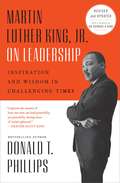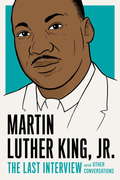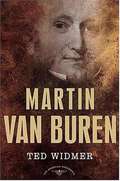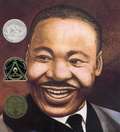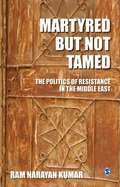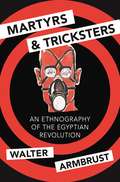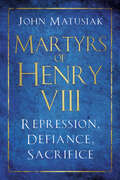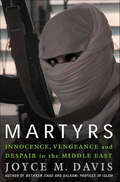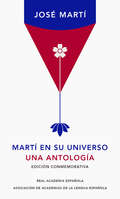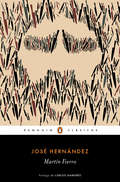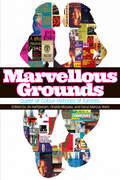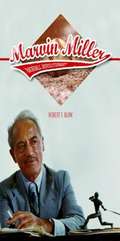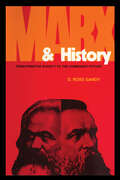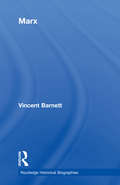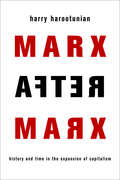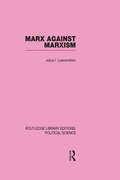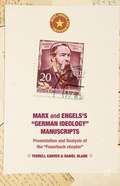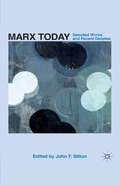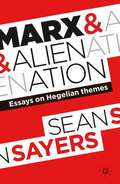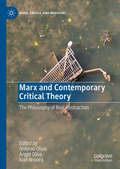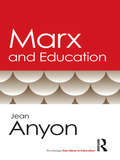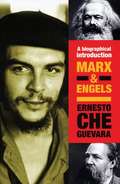- Table View
- List View
Martin Luther King, Jr., on Leadership: Inspiration and Wisdom for Challenging Times
by Donald T. PhillipsLeadership motivational speaker Donald T. Phillips, who has previously drawn organizational lessons for modern businesses from the careers of Abraham Lincoln and the Founding Fathers, turns to civil-rights leader Martin Luther King Jr. as a role model. A discussion of the Montgomery bus boycott, for example, draws out such principles as "Set goals and create a plan of action" and "Involve the people." More effective as a self-help book for business than as a biography, it does provide a useful introduction to King's life.
Martin Luther King, Jr.: and Other Conversations
by Martin Luther KingAs the Black Lives Matter movement gains momentum, and books like Ta-Nehisi Coates's Between the World and Me and Claudia Rankine's Citizen swing national attention toward the racism and violence that continue to poison our communities, it's as urgent now as ever to celebrate Martin Luther King, Jr., whose insistence on equality and peace defined the Civil Rights Movement and forever changed the course of American history. This collection ranges from an early 1961 interview in which King describes his reasons for joining the ministry (after considering medicine), to a 1964 conversation with Robert Penn Warren, to his last interview, which was conducted on stage at the convention of the Rabbinical Assembly, just ten days before King's assassination. Timely, poignant, and inspiring, Martin Luther King, Jr.: The Last Interview is an essential addition to the Last Interview series.
Martin Van Buren (The American Presidents Series)
by Arthur M. Schlesinger Ted WidmerThe first president born after America's independence ushers in a new era of no-holds-barred democracy The first "professional politician" to become president, the slick and dandyish Martin Van Buren was to all appearances the opposite of his predecessor, the rugged general and Democratic champion Andrew Jackson. Van Buren, a native Dutch speaker, was America's first ethnic president as well as the first New Yorker to hold the office, at a time when Manhattan was bursting with new arrivals. A sharp and adroit political operator, he established himself as a powerhouse in New York, becoming a U.S. senator, secretary of state, and vice president under Jackson, whose election he managed. His ascendancy to the Oval Office was virtually a foregone conclusion. Once he had the reins of power, however, Van Buren found the road quite a bit rougher. His attempts to find a middle ground on the most pressing issues of his day-such as the growing regional conflict over slavery-eroded his effectiveness. But it was his inability to prevent the great banking panic of 1837, and the ensuing depression, that all but ensured his fall from grace and made him the third president to be denied a second term. His many years of outfoxing his opponents finally caught up with him. Ted Widmer, a veteran of the Clinton White House, vividly brings to life the chaos and contention that plagued Van Buren's presidency-and ultimately offered an early lesson in the power of democracy.
Martin Van Buren: Eighth President Of The United States
by Rafaela EllisTraces the childhood, education, employment, political career, and presidency of the man from Kinderhook, New York.
Martin's Big Words: The Life Of Dr. Martin Luther King, Jr.
by Doreen RappaportThis picture book biography of Dr. Martin Luther King, Jr. brings his life and the profound nature of his message to young children through his own words. Martin Luther King, Jr. , was one of the most influential and gifted speakers of all time. Doreen Rappaport uses quotes from some of his most beloved speeches to tell the story of his life and his work in a simple, direct way. A timeline and a list of additional books and web sites help make this a standout biography of Dr. King.<P><P> Winner of the Caldecott Honor<P> Jane Addams Children’s Book Award Winner
Martyrdom in Modern Islam
by Meir HatinaThe Islamic resurgence in modern times has received extensive treatment in scholarly literature. Most of this literature, however, deals with the concept of jihad and disputes between radicals and their rivals over theological and political issues, and far less with martyrdom and death. Moreover, studies that do address the issue of martyrdom focus mainly on "suicide" attacks - a phenomenon of the late twentieth century and onward - without sufficiently placing them within a historical perspective or using an integrative approach to illuminate their political, social, and symbolic features. This book fills these lacunae by tracing the evolving Islamic perceptions of martyrdom, its political and symbolic functions, and its use of past legacies in both Sunni and Shi'i milieus, with comparative references to Judaism, Christianity, and other non-Islamic domains. Based on wide-ranging primary sources, along with historical and sociological literature, the study provides an in-depth analysis of modern Islamic martyrdom and its various interpretations while also evaluating the historical realities in which such interpretations were molded and debated, positing martyrdom as a vital component of contemporary identity politics and power struggles.
Martyred but Not Tamed
by Ram Narayan KumarPart historical chronicle, part socio-political treatise, Martyred but Not Tamed is devoted to the Middle East and focuses on the four most combustible countries at the heart of this supremely volatile area-Palestine, Lebanon, Syria and Iraq. Based on a series of extensive interviews with local actors, it also draws on the author's extensive scholarship. Attentive throughout to the viewpoints of the victims, it stands as a refreshing corrective to the distortions or downright lies which all too often inform the 'authoritative' discourse on the modern Middle East. Along the way, in a systematic, thorough, yet vivid and highly readable manner, the book revisits several 'well-known' episodes of recent history, but with an unsparing gaze, untainted by the softening lenses which tend to distort the self-serving Western narrative. It highlights the role played by Britain and the other colonial powers, which for pure expediency did not hesitate to carve up the body politic of the region; to exacerbate and exploit existing divides; to create new divisions where none existed; and to draw borders that defied all ethnic and historical logic, thereby sowing the seed of intractable conflicts such as the one between Israel and the Palestinians. Lastly, in a long, densely informative chapter on "oil politics", the book lays bare the naked economic and strategic interests which prompted nearly all the moves of the imperial powers in the region, from the days of overt colonial occupation down to the present age of indirect control and disguised hegemony.
Martyrs and Tricksters: An Ethnography of the Egyptian Revolution (Princeton Studies in Muslim Politics #72)
by Walter ArmbrustAn important look at the hopeful rise and tragic defeat of the Egyptian Revolution of 2011The Egyptian Revolution of 2011 began with immense hope, but was defeated in two and a half years, ushering in the most brutal and corrupt regime in modern Egyptian history. How was the passage from utmost euphoria into abject despair experienced, not only by those committed to revolutionary change, but also by people indifferent or even hostile to the revolution? In Martyrs and Tricksters, anthropologist and Cairo resident Walter Armbrust explores the revolution through the lens of liminality—initially a communal fellowship, where everything seemed possible, transformed into a devastating limbo with no exit. To make sense of events, Armbrust looks at the martyrs, trickster media personalities, public spaces, contested narratives, historical allusions, and factional struggles during this chaotic time.Armbrust shows that while martyrs became the primary symbols of mobilization, no one took seriously enough the emergence of political tricksters. Tricksters appeared in media—not the vaunted social media of a “Facebook revolution” but television—and they paved the way for the rise of Abd al-Fattah al-Sisi. In the end Egypt became a global political vanguard, but not in the way the revolutionaries intended. What initially appeared as the gateway to an age of revolution has transformed the world over into the age of the trickster.Delving into how Egyptians moved from unprecedented exhilaration to confusion and massacre, Martyrs and Tricksters is a powerful cultural biography of a tragic revolution.
Martyrs of Henry VIII: Repression, Defiance, Sacrifice
by John MatusiakTudor England was a place of religious upheaval and uncertainty, as the Catholic church was replaced by the Church of England, with Henry VIII at its head. When Henry VIII passed through Canterbury in 1532, a young woman named Elizabeth Barton, known as the Holy Maid of Kent and widely revered as a visionary, warned him that he was 'so abominable in the sight of God that he was not worthy to tread on hallowed ground'. Two years later she was executed as an enemy of the state, but she would not be the last to be punished for her faith – the summer of 1535 would see many others suffer the same fate. On 14 June 1535, Carthusian monk Sebastian Newdigate was dragged to Tyburn and hanged, drawn and quartered for his continued loyalty to the Catholic faith. On 22 June 1535, John Fisher was beheaded on Tower Hill for upholding the Roman Catholic Church's doctrine of papal supremacy. On 6 July 1535, former Chancellor of England Sir Thomas More was executed for refusing to acknowledge Henry VIII as the Supreme Head of the Church. All three were recognised as martyrs and beatified by the Catholic church in 1886, with Sir Thomas More and John Fisher recognised as saints. In Martyrs of Henry VIII, John Matusiak brings the lives of these Catholic martyrs together in a joint biography that opens a window into one of the most dangerous periods of England's religious history.
Martyrs: Innocence, Vengeance and Despair in the Middle East
by Joyce M. DavisMartyrs offers compelling and chilling interviews with terrorist trainers, with the families of suicide bombers, fighters and fanatics, and with Muslim scholars offering differing opinions on the legitimacy of violence in Islam. Through the voices of those who plan and those who grieve, Martyrs provides provocative and troubling insights into the zealotry that leads to the targeting of innocents, the endless cycle of revenge, and the despair that besets the Middle East. From Iran to Lebanon and the Palestinian territories, Joyce Davis reports on the rage that drives tragedies and at the despondency of the mothers of those who die and kill. Unsettling as the perspectives presented here may be, they are crucial to understanding, though not accepting, the fury at and resentment of the US.
Martí en su universo: Una antología
by José MartíEl escritor que revolucionó la literatura en español. Nueva edición conmemorativa de la Real Academia Española y la Asociación de Academias de la Lengua Española. Poeta, ensayista, diplomático y político, el cubano José Martí es uno de los escritores latinoamericanos más importantes en la literatura del siglo XX en español. Precursor del modernismo que saltaría el océano Atlántico para instalarse también en España, inspirador de los movimientos revolucionarios que desembocaron en la independencia de Hispanoamérica, su poesía fue reconocida por autores de la talla de Juan Ramón Jiménez, Gabriela Mistral o María Zambrano. Como poeta, Martí influyó más allá del modernismo, ya que su compromiso político con la libertad hizo que en décadas mucho más recientes algunos de sus poemas fueran adaptados como canciones por figuras como Pablo Milanés o Silvio Rodríguez. Esta antología, preparada porla Real Academia Española y las Academias miembros de la ASALE, incluye toda la poesía de Martí, además de textos en prosa (artículos, ensayos, discursos) que dan cuenta de la dimensión total del autor. La edición se completa con estudios sobre el autor y su obra que dan cuenta de la dimensión de Martí como escritor, además de con un glosario y un índice onomástico. La crítica ha dicho:«Mi impresión es, dejada aparte la prosa, la de que los Versos sencillos son la isla genuina de la originalidad poética de Martí, que son la médula martiana, adonde no pudo colarse el enemigo. Esta isla me es, por eso, particularmente querida. Tengo en ella mis mayores gozos con el Maestro; tengo allí con él mi coloquio más logrado; desde este pedazo de su obra cae sobre mí el rayo martiano más vertical.»Gabriela Mistral «Martí no podía dejar de ser universal, de sentir universalmente el trozo de historia que le tocó vivir.»María Zambrano «Su ternura se alimentaba de un encantado manto freático, en territorios ubicados al sur y al norte. Al viajar, alternando miradas de águila y de paloma, le crecieron nuevas ramas y raíces, como al ser destinado por los aleros para meditar en las más agudas y suaves aristas materiales. Era un coloso colosal.»José Lezama Lima «Sería difícil citar otro caso de identificación de un país con un hombre, que alcance la magnitud de la encarnación de Cuba en la persona y la obra de José Martí.»Cintio Vitier
Martín Fierro
by José HernandezEl poema nacional por excelencia, la obra cumbre del género gauchesco en su edición definitiva, con prólogo de Carlos Gamerro y notas introductorias de Alejandra Laera. «Nunca se achican los males / Van poco a poco creciendo, / y ansina me vide pronto / Obligao a andar juyendo / No tenia mujer ni rancho, / Y a más era resertor; / No tenia una prenda güena / Ni un peso en el tirador.»(Canto VII) Escritos en 1872 y 1879, los dos volúmenes que componen el poema épico Martín Fierro son la culminación del género gauchesco y el máximo exponente de la literatura argentina a nivel mundial. A través de la narración de las peripecias del héroe -el gaucho Fierro, uno de los personajes más vitales, brutales y contradictorios de las letras nacionales-, José Hernández pone en evidencia la cruda realidad a la que se veían enfrentados los hombres del siglo XIX enviados a la frontera a luchar contra los indios y denuncia los abusos de poder por parte de un Estado corrupto y arbitrario. «El Martín Fierro se ha entrelazado hasta tal punto con su mundo, que es el nuestro; con nuestra literatura anterior y posterior, nuestra lengua, nuestro pensamiento, nuestra política, nuestros valores y maneras de vivir y sentir y mirar ese mundo, que ya no sabemos si provienen del mundo o del poema.»Del prólogo de Carlos Gamerro
Marvellous Grounds: Queer of Colour Histories of Toronto
by Jin Haritaworn, Ghaida Moussa, and Syrus Marcus WareToronto has long been a place that people of colour move to in order to join queer of colour communities. Yet the city’s rich history of activism by queer and trans people who are Black, Indigenous, or of colour (QTBIPOC) remains largely unwritten and unarchived. While QTBIPOC have a long and visible presence in the city, they always appear as newcomers in queer urban maps and archives in which white queers appear as the only historical subjects imaginable. The first collection of its kind to feature the art, activism, and writings of QTBIPOC in Toronto, Marvellous Grounds tells the stories that have shaped Toronto’s landscape but are frequently forgotten or erased. Responding to an unmistakable desire in QTBIPOC communities for history and lineage, this rich volume allows us to imagine new ancestors and new futures.
Marvin Miller, Baseball Revolutionary (Sport and Society)
by Robert F BurkMarvin Miller changed major league baseball and the business of sports. Drawing on research and interviews with Miller and others, Marvin Miller, Baseball Revolutionary offers the first biography covering the pivotal labor leader's entire life and career. Baseball historian Robert F. Burk follows Miller's formative encounters with Depression-era hard times, racial and religious bigotry, and bare-knuckle Washington politics to a successful career in labor that prepared Miller for his biggest professional challenge--running the moribund Major League Baseball Players Association. Educating and uniting the players as a workforce, Miller embarked on a long campaign to win the concessions that defined his legacy: decent workplace conditions, a pension system, outside mediation of player grievances and salary disputes, a system of profit sharing, and the long-sought dismantling of the reserve clause that opened the door to free agency. Through it all, allies and adversaries alike praised Miller's hardnosed attitude, work ethic, and honesty. Comprehensive and illuminating, Marvin Miller, Baseball Revolutionary tells the inside story of a time of change in sports and labor relations, and of the contentious process that gave athletes in baseball and across the sporting world a powerful voice in their own games.
Marx & History: From Primitive Society to the Communist Future
by D. Ross GandyIn this book Marx's observations on history, which are found scattered throughout his voluminous writings, are brought together and subjected to searching analysis. D. Ross Gandy writes in refreshingly direct language, without resorting to jargon. For the first time we have a thoughtful assessment of Marx's views on all the epochs that cross his historical vision. Gandy treats Marx's ideas on primitive societies, on ancient Roman and Asiatic civilization, on the structure of feudalism, on strategies for overthrowing capitalism, and on the hypothetical communist future. Among the author's departures from traditional readings of Marx are his interpretations of class struggle, his conception of social strata, and his cogent analysis of the "new Marxism." Since many aspects of Marxist historical theory have been neglected or distorted, Gandy's remarkably clear commentary, based on extensive research—including an exhaustive study of the forty-volume Marx-Engels Werke—will doubtless stimulate debate among sociologists and other students of social change, political scientists, and historians.
Marx & History: From Primitive Society to the Communist Future
by D. Ross Gandy&“Gandy has attempted a much-needed reinterpretation of Marx&’s theory of history—one that, everything considered, deserves the reader&’s attention.&” —American Political Science Review In this book Karl Marx&’s observations on history, which are found scattered throughout his voluminous writings, are brought together and subjected to searching analysis—in refreshingly direct language, without jargon. For the first time we have a thoughtful assessment of Marx&’s views on all the epochs that cross his historical vision. D. Ross Gandy treats Marx&’s ideas on primitive societies, on ancient Roman and Asiatic civilization, on the structure of feudalism, on strategies for overthrowing capitalism, and on the hypothetical communist future. Among the author&’s departures from traditional readings of Marx are his interpretations of class struggle, his conception of social strata, and his cogent analysis of the &“new Marxism.&” Since many aspects of Marxist historical theory have been neglected or distorted, Gandy&’s remarkably clear commentary, based on extensive research—including an exhaustive study of the forty-volume Marx-Engels Werke—will doubtless stimulate debate among sociologists and other students of social change, political scientists, and historians.
Marx (Routledge Historical Biographies)
by Vincent BarnettKarl Marx has been portrayed in equal measure both as a political prophet who foresaw the end of capitalist exploitation, and as a populist Anti- Christ whose totalitarian legacy has cost millions of lives worldwide. This new biography looks beyond these caricatures in order to understand more about the real Karl Marx; about his everyday life and personal circumstances as well as his political ideology. The book tells the life story of a man of ideas, showing how his political and economic thought developed alongside his life and practical work. Vincent Barnett seeks to paint Karl Marx not as a static, unwavering character, but as a man whose beliefs developed dynamically over time. The book explores his personal background, and problems of personal income and family health. It also examines the influence of Hegel's methods on Marx's work, and his relationship with Engels. This lively, up to date guide to the life of Karl Marx provides an excellent starting point for students in history, politics and philosophy, and for all those with an interest in Marxism and political ideas.
Marx After Marx: History and Time in the Expansion of Capitalism
by Harry HarootunianIn Marx After Marx, Harry Harootunian questions the claims of Western Marxism and its presumption of the final completion of capitalism. If this shift in Marxism reflected the recognition that the expected revolutions were not forthcoming in the years before World War II, its Cold War afterlife helped to both unify the West in its struggle with the Soviet Union and bolster the belief that capitalism remained dominant in the contest over progress. This book deprovincializes Marx and the West's cultural turn by returning to the theorist's earlier explanations of capital's origins and development, which followed a trajectory beyond Euro-America to Asia, Africa, and Latin America. Marx's expansive view shows how local circumstances, time, and culture intervened to reshape capital's system of production in these regions. His outline of a diversified global capitalism was much more robust than was his sketch of the English experience in Capital and helps explain the disparate routes that evolved during the twentieth century. Engaging with the texts of Lenin, Luxemburg, Gramsci, and other pivotal theorists, Harootunian strips contemporary Marxism of its cultural preoccupation by reasserting the deep relevance of history.
Marx Against Marxism (Routledge Library Editions: Political Science #56)
by Julius LowensteinThis volume traces the origins, contradictions and consequences of Marx’s teaching on his followers. He uses Marx to speak against the rigid dogmatism inherent in much of Marxism and concentrates on the interpretations of Marx’s work by Max Weber.
Marx And Engels’s "german Ideology" Manuscripts
by Terrell Carver Daniel BlankThis work presents a wholly original translation and philosophical analysis of the two authors' rough work in the so-called 'Feuerbach' chapter.
Marx Today
by John F. SittonThis book provides, in one volume, primary sources by Marx and critical commentary which relates Marxism to contemporary social and political topics. No previous anthology of Marx has combined both brief works by Marx and multiple critical essays elaborating on his themes or engaging the shortcomings of his arguments.
Marx and Alienation
by Sean SayersThe concepts of alienation and its overcoming are central to Marx's thought. They underpin his critique of capitalism and his vision of future society. Marx's ideas are explained in rigorous and clear terms. They are situated in the context of the Hegelian ideas that inspired them and put into dialogue with contemporary debates.
Marx and Contemporary Critical Theory: The Philosophy of Real Abstraction (Marx, Engels, and Marxisms)
by Antonio Oliva Ángel Oliva Iván NovaraThis edited volume brings together an international and interdisciplinary group of scholars to explore the traces of the idea of “Real Abstraction” in Marx’s thought from the early to late writings, as well as the theoretical and practical consequences of this notion in the capitalist social system. Divided into two main parts, Part One reconstructs Marx’s notion of “Real Abstraction” and the influences of earlier thinkers (Berkley, Petty, Franklin, Feuerbach, Hegel) on his thoughts, as well as the further elaborations of this concept in later Marxist thinkers (Sohn-Rethel, Lukács, Lefebvre, Adorno and Postone). Part Two then considers the reverberations of the notion in the field of critical theory from a more abstract critique of capitalist social relations, to a more concrete understanding of historical movements. Taken together, the chapters in this volume offer a focused look at the concept of “Real Abstraction” in Marx.
Marx and Education (Routledge Key Ideas in Education)
by Jean AnyonThere was only one Karl Marx, but there have been a multitude of Marxisms. This concise, introductory book by internationally renowned scholar Jean Anyon centers on the ideas of Marx that have been used in education studies as a guide to theory, analysis, research, and practice. Marx and Education begins with a brief overview of basic Marxist ideas and terms and then traces some of the main points scholars in education have been articulating since the late 1970s. Following this trajectory, Anyon details how social class analysis has developed in research and theory, how understanding the roles of education in society is influenced by a Marxian lens, how the failures of urban school reform can be understood through the lens of political economy, and how cultural analysis has laid the foundation for critical pedagogy in US classrooms. She assesses ways neo-Marxist thought can contribute to our understanding of issues that have arisen more recently and how a Marxist analysis can be important to an adequate understanding and transformation of the future of education and the economy. By exemplifying what is relevant in Marx, and replacing that which has been outdone by historical events, Marx and Education aims to restore the utility of Marxism as a theoretical and practical tool for educators.
Marx and Engels: A Biographical Introduction
by Ernesto Che GuevaraThis Che Guevara book makes an insightful contribution to the revival of interest in Marxism. Commenting on Marx's humanism, Che writes: "Such a humane man, whose capacity for affection extended to all those suffering throughout the world."
